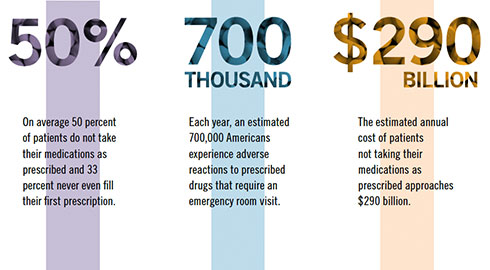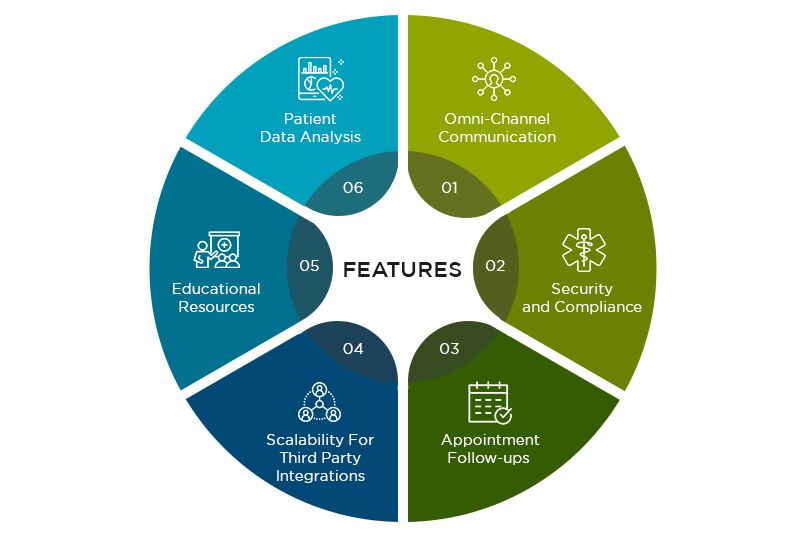Empowering Care Services with Patient Engagement Systems
In today’s rapidly evolving healthcare solution landscape, the integration of digital technologies is no longer optional—it is essential. As patient expectations shift toward more accessible, personalized, and data-driven care, healthcare providers must embrace tech innovations in healthcare to enhance service delivery and operational efficiency. One of the most transformative tools in this evolution is patient engagement systems and software, which acts as a vital bridge between patients and healthcare providers. These systems go beyond traditional healthcare models, fostering proactive communication, improved treatment adherence, and a seamless care experience.
The growing adoption of healthcare IT solutions is driven by the increasing demand for patient-centric care. Studies indicate that highly engaged patients are more likely to adhere to treatment plans, actively participate in their healthcare decisions, and experience improved clinical outcomes. In fact, a 2023 report by Business Wire revealed that 80% of patients expect digital interactions with their healthcare providers, further reinforcing the importance of healthcare digital transformation consulting in modern medical practices.
This article delves into the fundamentals of patient engagement systems, exploring their role in modern healthcare, why they are essential, the different types available, the key factors to consider when selecting one, and the long-term benefits they offer to both patients and providers.
1. What is Patient Engagement?
At its core, patient engagement refers to the active involvement of individuals in their healthcare journey, fostering a partnership between patients and medical professionals. It is built on the foundation of transparent communication, shared decision-making, and a commitment to preventive care. Unlike traditional, provider-led approaches, patient engagement shifts the focus toward a more interactive and patient-driven model.
Highly engaged patients not only follow prescribed treatments but also leverage digital tools such as healthcare CRM systems, mobile app development, and wearable devices to monitor their health. With the rise of healthcare mobile app development, individuals now have access to real-time health data, educational resources, and virtual consultations, empowering them to make informed decisions.
Furthermore, research highlights that effective patient engagement can lead to significant improvements in health outcomes and healthcare efficiency. As more healthcare providers invest in custom healthcare software and healthcare app development companies, the potential to transform patient experiences and reduce operational burdens continues to expand.
2. Why Should You Have a Patient Engagement System?
The modern healthcare landscape is evolving rapidly, with patient expectations shifting toward more healthcare digital transformation consulting and personalized experiences. A patient engagement system is no longer a luxury but a necessity for healthcare providers aiming to improve care delivery, operational efficiency, and patient satisfaction.
A patient engagement system is a comprehensive technological platform that bridges the gap between patients and healthcare providers, ensuring seamless interactions, efficient care management, and data-driven decision-making. Its implementation offers several critical advantages:
-
Enhanced Communication: Timely and transparent communication is crucial in healthcare. With an integrated healthcare CRM system, providers can send appointment reminders, follow-up messages, and treatment updates through multiple channels such as emails, SMS, and mobile app development.
-
Improved Compliance: A significant challenge in patient care is adherence to treatment plans. Patient engagement software helps by offering medication reminders, self-assessment tools, and virtual check-ins, ensuring patients stay on track with their health goals. A report from the World Health Organization (WHO) suggests that 50% of patients do not take medications as prescribed, leading to preventable complications and hospital readmissions.

Image source: SCOTT D Miller
-
Data-Driven Insights: The integration of healthcare IT solutions allows providers to collect and analyze patient data, offering personalized treatment recommendations. Health data analytics tools track patient progress, predict potential health risks, and help in crafting tailored care plans.
-
Operational Efficiency: By automating administrative tasks such as scheduling, billing, and patient documentation, custom healthcare software allows healthcare professionals to focus more on patient care rather than paperwork. The automation of these processes reduces overhead costs, minimizes errors, and enhances workflow management.
As the demand for tech innovations in healthcare grows, the adoption of patient engagement systems has become a critical factor in improving both patient outcomes and healthcare provider efficiency.
Get in touch with Savvycom for a free consultation. We’ll help you decide on next steps, explain how the development process is organized, and provide you with a free project estimate.
3. Types of Patient Engagement Systems
Different healthcare app development companies have developed various types of patient engagement software, each serving a unique function within healthcare delivery. Here are the most common types:

Image source: EMed HealthTech
-
Telehealth: Virtual healthcare services have become a staple in modern medicine, allowing patients to consult with healthcare providers remotely. The rise of healthcare mobile app development has facilitated teleconsultations, reducing the burden on hospitals and making care more accessible, particularly in rural areas. According to McKinsey, telehealth usage has stabilized at 38 times the pre-pandemic levels, proving its long-term viability.
-
Healthcare Payment Automation: Managing payments efficiently is crucial for both patients and providers. Automated billing systems streamline financial transactions, ensuring timely payments while reducing administrative burdens. This is particularly useful for outsourcing in healthcare, where billing and claims processing can be managed more efficiently through digital platforms.
-
Remote Patient Monitoring (RPM): Wearable devices and home-monitoring tools allow healthcare providers to track vital health indicators in real-time. This form of blockchain in healthcare ensures secure and immutable patient records, reducing errors and enhancing treatment effectiveness. RPM is particularly beneficial for chronic disease management, with studies showing that patients using RPM tools experience a reduction in hospital admissions.
-
Automated Appointment Reminder Systems: Missed appointments cost the U.S. healthcare system an estimated $150 billion annually. Automated reminders sent via SMS, email, or push notifications through healthcare app ideas significantly reduce no-show rates, ensuring better resource utilization and patient adherence to care plans.
-
Health Data Analytics: Data-driven decision-making is revolutionizing healthcare. With advanced healthcare CRM systems, providers can analyze patient trends, predict disease risks, and personalize treatment strategies based on AI-driven insights.
-
Patient Portals: Providing patients with access to their medical records, test results, and secure messaging platforms enhances transparency and engagement. These portals are a core component of healthcare digital transformation consulting, promoting patient empowerment and informed decision-making.
4. How Do You Select a Suitable Patient Engagement System?
Selecting the right patient engagement software requires careful consideration of several key factors to ensure it aligns with both patient needs and healthcare provider objectives:

Image source: OSP
-
Omni-Channel Communication: The system should support multiple communication channels, including mobile apps, chatbots, SMS, and email. A healthcare CRM system that integrates these features ensures patients remain engaged across all touchpoints.
-
Security and Compliance: With stringent healthcare regulations such as HIPAA in the U.S. and GDPR in Europe, custom healthcare software must be designed with data security at its core. Blockchain in healthcare is emerging as a reliable solution for ensuring data integrity and reducing security breaches.
-
Appointment Follow-ups: Consistent follow-ups improve patient adherence to treatments and reduce hospital readmissions. Systems with automated reminders and virtual check-ins provide significant value.
-
Scalability for Third-Party Integrations: Healthcare providers often rely on multiple digital tools. An effective healthcare mobile app development solution should easily integrate with healthcare IT solutions, electronic health records (EHRs), and third-party applications.
-
Educational Resources: A well-informed patient is more likely to comply with treatment plans. Systems that offer interactive learning modules, symptom checkers, and tele-education tools empower patients to take control of their health.
-
Patient Data Analysis: AI-driven analytics provide insights into patient behaviors, treatment effectiveness, and population health trends, allowing providers to refine their services and enhance care delivery.
5. Benefits of Efficient Patient Engagement
The implementation of a robust patient engagement software brings multiple benefits to healthcare providers and patients alike:
-
Better Care Outcomes: Engaged patients are more proactive about their health, leading to lower hospitalization rates and better management of chronic conditions. A study by the CDC found that engaged patients are 30% less likely to require emergency care.
-
Higher Provider Productivity: Automation reduces administrative tasks, allowing healthcare professionals to dedicate more time to patient care.
-
Cost Reduction and Added Revenue: Streamlined operations lower overhead costs and increase patient retention, ultimately boosting revenue streams.
-
Improved Management of Private Health Data: With blockchain in healthcare, patient records are securely stored, minimizing data breaches and unauthorized access.
-
Improved Accessibility: Digital solutions bridge gaps in healthcare delivery, ensuring that patients in remote or underserved areas can access quality care.
-
Personalized Care Solutions: AI-driven healthcare IT solutions leverage patient data to customize treatment plans, enhancing care personalization.
Conclusion
As healthcare digital transformation consulting reshapes the industry, patient engagement systems are proving to be indispensable tools for delivering superior care. By integrating technologies such as healthcare CRM systems, healthcare mobile app development, and blockchain in healthcare, providers can enhance patient communication, drive operational efficiency, and improve health outcomes.
Savvycom, a leading software development company, specializes in crafting innovative custom healthcare software tailored to modern healthcare needs. With expertise in healthcare IT solutions, mobile app development, and outsourcing in healthcare, Savvycom helps healthcare organizations implement cutting-edge patient engagement software to optimize care delivery. If you’re looking for a trusted partner in healthcare app development companies, Savvycom is here to transform your vision into reality.
Tech Consulting, End-to-End Product Development, Cloud & DevOps Service! Since 2009, Savvycom has been harnessing digital technologies for the benefit of businesses, mid and large enterprises, and startups across the variety of industries. We can help you to build high-quality software solutions and products as well as deliver a wide range of related professional services.
Savvycom is right where you need. Contact us now for further consultation:
- Phone: +84 24 3202 9222
- Hotline: +1 408 663 8600 (US); +612 8006 1349 (AUS); +84 32 675 2886 (VN)
- Email: [email protected]


